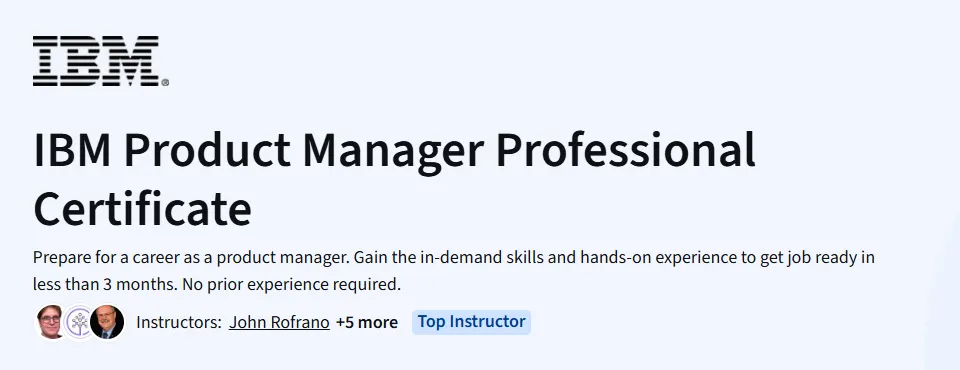What will you learn in IBM Product Manager Professional Certificate Course
Develop and communicate product vision, roadmap, and user-centric strategy.
Use data to drive product decisions and understand user needs.
Master tools like Agile, Scrum, Jira, and roadmapping software.
Collaborate with cross-functional teams to execute product lifecycle processes.
Program Overview
Module 1: Introduction to Product Management
⏱️ 2 weeks
Topics: Product manager roles, product lifecycle, key skills
Hands-on: Case studies analyzing successful products
Module 2: Understanding Your Customers and Market
⏱️ 2 weeks
Topics: User personas, market research, problem validation
Hands-on: Develop user journey maps and problem statements
Module 3: Agile Product Development
⏱️ 3 weeks
Topics: Agile methodologies, Scrum roles, product backlog
Hands-on: Create sprint plans and manage agile workflows using Jira
Module 4: UI/UX and Prototyping for Product Managers
⏱️ 2 weeks
Topics: Wireframes, user stories, Figma, usability testing
Hands-on: Build a clickable prototype for a mock product
Module 5: Data-Driven Product Management
⏱️ 2 weeks
Topics: KPIs, analytics tools, A/B testing, customer feedback loops
Hands-on: Design product experiments and analyze performance data
Module 6: Product Marketing and Growth
⏱️ 2 weeks
Topics: Go-to-market strategies, product launches, pricing
Hands-on: Draft a product launch plan with positioning
Module 7: Capstone Project – Create Your Own Product Case
⏱️ 2 weeks
Topics: Apply all concepts to a single product journey
Hands-on: Present a full product pitch deck with prototype and roadmap
Get certificate
Job Outlook
Growing demand for product managers in tech, SaaS, and consumer businesses.
Salaries typically range from $90,000 to $140,000 per year.
Ideal for roles like Product Manager, Associate PM, Product Owner, and Startup Founder.
Strong potential for upward mobility into senior PM or Director roles.
Specification: IBM Product Manager Professional Certificate
|
FAQs
- Yes, the program is beginner-friendly and does not assume coding skills.
- Emphasis is on strategy, customer research, and product vision.
- Technical aspects are introduced only at a high-level understanding.
- Tools like Jira, Figma, and analytics platforms are explained from scratch.
- Ideal for career changers moving into tech or startups.
- Product managers define what to build and why.
- Project managers focus on how and when work gets done.
- Product management is long-term and customer-driven; project management is delivery-driven.
- PMs work on vision, strategy, and growth; project managers ensure deadlines and budgets.
- Both roles often collaborate but serve different business needs.
- Tech giants (SaaS, cloud, and consumer apps).
- Startups building new digital products.
- Fintech and e-commerce companies focusing on user-centric products.
- Consulting firms offering product development solutions.
- Non-tech sectors (healthcare, retail, education) with digital platforms.
- Teaches how to validate problems before building solutions.
- Helps in creating MVPs and testing market fit.
- Offers frameworks for prioritizing limited resources.
- Covers product launch strategies crucial for startups.
- Strengthens ability to pitch ideas to investors with data-backed insights.
- Entry roles: Associate Product Manager or Junior PM.
- Mid-level: Product Manager, Product Owner, or Growth PM.
- Specialized roles: Data Product Manager, UX Product Manager.
- Entrepreneurship: Startup founder or product lead.
- Long-term growth into Senior PM, Director of Product, or VP roles.





